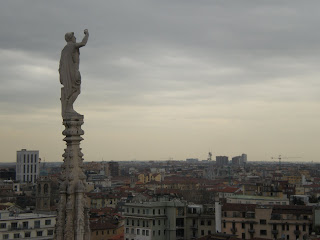I’m asking Caroline about a previous conversation we had on the social “do’s and don’ts” of Milan when our server, a 70-year-old woman with orange hair, presents us with a bottle of wine. Of course, every country has certain behavior parameters. Bicycles are king of the street in Amsterdam, for instance, while pedestrians equate to a target with shoes. Germans, on the other hand, take a crosswalk signal at its word, skipping the whole “look left, look right” deal, they’ll gambol into the street no matter what is barreling down the road toward them.
I’m mulling over Caroline’s list as Jesse fills the glasses. As you can imagine, the rules of Milan deal primarily with food and style. Their taste for food is somewhat traditional; their style, classy. That said, it never ceases to amaze me how quickly people resort back to middle school.
“You don’t leave the house with wet hair,” she said.
“What happens if you do,” I asked.
“People give you dirty looks. Waiters will look down on you.”
This may sound harmless, but no matter how hard you wave, a waiter will only see you when he is ready to see you. The customer is always right is not a common axiom here. You are in their world, so you’d better style accordingly.
The wet hair rule, I feel, is geared more toward women, the implication being that if you are too lazy to dry your hair after a shower, you’ll probably die alone anyhow, so stay home and do us all a favor. This also explains the twenty-seven umbrella salesmen that bombarded Takayo in the subway after a sudden downpour. A lot of men use hair product, which can give the impression of being wet, but I’m sure that patting a stranger’s head violates a different set of rules.
“You don’t wear flip-flops before ‘flip-flop season,’ which has no exact date, but is determined by some unknown fashion circle.”
I like this one because it sounds like the premise of a Dan Brown novel: A city gripped by a mysterious society obsessed with creating a legion of fashion forward citizens. Aside from the vague timing, the flip-flop rule is a throwback to America’s “no white shoes after Labor day” rule, which has become largely ignored. The fact that there is a Wal-Mart in Milan, Tennessee, and not Milan, Italy, is no coincidence.
“You don’t eat on the go.”
Besides apples, which have artistic merit, this is a rule that I agree with. Good food should be appreciated, not crammed down your throat while passing the United Colors of Benetton. I’ll take this rule a step farther: A McDonald’s hamburger was designed to be eaten under fluorescent lighting, not sunshine.
When the waitress returns, she places a fine looking pizza before everyone but me. I ordered a pasta dish with mozzarella and eggplant, but what she sets before me looks like a Terracotta roof tile drizzled with tomato sauce. It’s familiar enough, but so is the view from our budget hotel, and neither one is really all that compelling.
“How’s your…what have you,” Caroline asks.
“Fine. Are there any more rules, aside from don’t order this?”
“You don’t drink wine with pizza.”
“What are you supposed to drink?”
“Beer. The three of us are breaking the rules.”
We all looked around to the other diners in the room and it was true. All the pizza eaters had a glass of beer. We were the only ones with a bottle of wine on the table, if that says anything.
I used to see myself as something of a rebel. Rules were a tool used by “The Man” to keep us down. Depending on your age and social circle, I suppose they still are to some people. But not me. Cecil B. deMille said, “It is impossible to break the law. We can only break ourselves against it.” This broadened my perspective as far as Milan is concerned. These rules are more like guidelines. They don’t so much oppress people as they protect them from social faux pas, holding them to a higher standard.
Except for the beer rule. That’s just stupid.
*


No comments:
Post a Comment